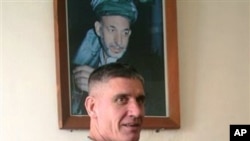U.S. President Barack Obama is expected to announce the size of an American troop withdrawal from Afghanistan, within the next few weeks. U.S. military leaders are warning the reduction must not jeopardize the progress made in securing the country over the past year.
The top coalition commander in Afghanistan, General David Petraeus, is expected to soon present troop withdrawal options to the White House.
In December of 2009, President Barack Obama announced U.S. forces will begin to pull out of Afghanistan in July of this year. He also authorized the deployment of an additional 30,000 troops to combat the insurgency, bringing the total number of American soldiers in Afghanistan to 100,000.
Military officials say the surge has led to substantial progress in security in former Taliban strongholds. But Pentagon officials say these gains are fragile and reversible. They warn that any withdrawal should be gradual and based on security conditions on the ground.
Lieutenant General David Rodriguez is deputy commander of U.S. forces in Afghanistan.
“I am concerned about a drawdown that is not totally aligned with growing Afghan capabilities or is so rapid that the army and police make mistakes or temporarily leave gaps," said General Rodriguez. "Now if this happens the Taliban can regain their foothold among a fearful population.”
General Rodriguez says more than 284,000 Afghan security forces have been trained throughout the country, a 50 percent increase since 2009.
The training of Afghan forces is instrumental to the transition, with the security control of seven Afghan cities and provinces to be transferred from foreign to local forces within weeks.
“We have got to push our Afghan partners to start leading more and more. We have to start taking more risks in this regard and having more trust in them," he said.
While international troops work to build up Afghan forces, the violence has not waned. The Taliban has launched a campaign of attacks and intimidation that General Rodriguez says is aimed at destroying Afghans' confidence in their government’s ability to protect them.
“We are going to have to really focus our efforts with our Afghan partners to prevent these horrific attacks from ever changing the confidence and trust that the Afghan people have increasingly grown in areas where we focused," said Rodriguez.
The United States and NATO say they hope to have all international combat troops out of Afghanistan by 2014, with Afghan forces in control of security for the entire country.
But analysts say the allies have not been clear about regional goals after 2014, which they say concerns Afghanistan’s neighbors, especially Pakistan.
Retired Lieutenant General David Barno served in Afghanistan and is currently a senior fellow at the Center for a New American Security.
He says a force of between 25,000 to 35,000 American soldiers should be kept in Afghanistan after 2014 to fight al-Qaida and possibly remnants of the Taliban.
“The United States needs a long term, small military presence in this part of the world," said David Barno. "That sends an unmistakable message that we are going to remain committed.”
Another consideration for the White House is the cost of the Afghan war, currently more than $100 billion per year.
Given the difficult state of the U.S. economy and the killing of al-Qaida leader Osama bin Laden, some members of Congress are calling for an accelerated withdrawal from Afghanistan.
Analyst David Barno:
“I think we are going to have to find a way in the next 3.5 years to take our vast aid spigot of dollars and nick that down without collapsing the Afghan economy and helping to design something that gets to what some are calling 'Afghan good enough'," he said.
U.S. military officials expect Afghan leaders to decide in August which additional regions in the country can be shifted from allied to Afghan security control.
US Military Warns Against Hasty Afghan Withdrawal




